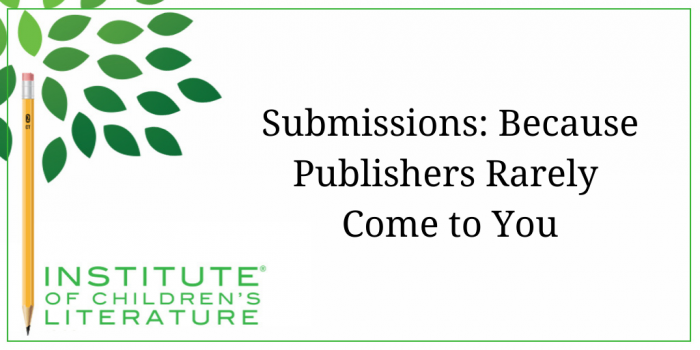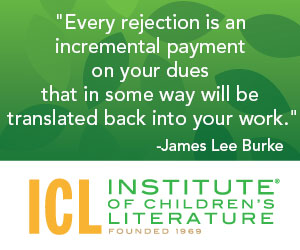1000 N. West Street #1200, Wilmington, DE 19801
© 2024 Direct Learning Systems, Inc. All rights reserved.

We teach our students how to write and get published!
View our Course Catalog >

We worry about whether we’re doing it right.
We struggle to find all the information we need to feel confident in submitting.
We’re easily depressed by all the markets that aren’t open to submissions.
And most of all, we really don’t like rejection.
All of this tends to make submitting one of the most procrastinated steps in writing. We put it off until we have time to research publishers. Then we put it off until we get the proper letter written. And mostly, we just put it off in whatever way we can.
But there’s a problem with this. You can’t sell if you don’t submit. Really, publishers very rarely come to you looking for a chance to publish you. And the ones who do are often looking for you to pay them. And when a publishing company asks for money, you rarely get the publishing experience you hoped for. So we all collectively need to push past the urge to procrastinate and simply take the plunge. Because rejection isn’t the biggest problem to publication, failure to research markets, follow guidelines, and submit is where true failure lies. So, let’s get going.
Now, I’ll admit, when I started freelance writing, I couldn’t afford a market guide. I could barely afford stamps (and back then, snail mail was all the rage). So I went regularly to the public library and studied the market guide they held in the reference section. I took notes. I looked for sample magazine copies in the library. I studied the “masthead” in magazines (this is the part of the magazine that lists the names of editors and usually also lists the editorial address of the publisher). I took more notes. And then I made my first submissions, and my first mistakes, and my first sales. So it’s possible to do this without a market guide, at least for a little while.
But I’ll be honest: it’s a lot easier with a good market guide. A good market guide today will give you specific information about submissions and will give you the URL for each market so you can extend your study online. I don’t take expense lightly (mostly because I’m cheap––so if you’re going to buy the ICL market guides, don’t forget to use your Writers’ Block discount if you’re a member), but this is an expense that is worth your money. Get a market guide and keep it updated. Now, you can do the work to update your market guide throughout the year by looking for updates on the magazine or book publisher website or on sites that share market information, and just write the updates into your market guide. Back when I was still pretty poor, I would do this and only buy a new market guide every other year. But it’s a lot of work, so these days I generally just make the yearly investment in a good market guide, and often more than one.
Now, at first glance, a market guide can be overwhelming. There tends to be a lot in there. You’ll find articles to help inform you about best practices as a writer or to help you know more about the industry today. You’ll also find lots of listings. And if you begin by skimming, you can get rather overwhelmed and downhearted, seeing all the markets that don’t seem like a good match for you (or that only accept submissions from agented writers or from previously published writers). But here’s the secret: you don’t need a whole book full of markets. Even a writer (like me) whose career is built on publishing with a lot of different publishers, you’ll likely not work with more than a dozen in your lifetime, and that market guide you bought contains hundreds. You don’t need them all. You only need a teeny tiny few.
With this in mind, I go through my market guide with two highlighters of contrasting colors. When I find a market I cannot use, I make an “x” through it with one color of highlighter. The nice thing about using a highlighter is that if my circumstances change, I have not rendered the market unreadable. I can read the market information right through the highlighter. But when I’m in a hurry and not wanting to read pointless information, I can skip over markets that don’t match my writing and stage of publishing well.
When I find a market that sounds like a good match for me because they do material similar to mine or maybe just because they’re open to submissions, I highlight the opening info with my second shade of highlighter, then go through the listing and highlight anything especially interesting with the same marker. So, for example, I may highlight a mention of how much a magazine pays, or a mention of genres a book publisher is especially interest in, especially when they coincide with a genre I enjoy writing.
After I finish with this step, I now have a tailor-made market guide especially for me. That way, when I’m looking for a market for a specific piece, I’m not overwhelmed with the hugeness of the total market guide. Instead, I’m choosing from among a much smaller pool of markets that I’ve already curated as “good for me.” I find this to be a huge time saver. And it means I don’t even pay attention to those poor match markets, so they don’t bum me out. They’re just someone else’s markets, and I have my own.
Never stop your study at the market guide. Go to the website of the market you’re considering and spend substantial time there. You want to see what sorts of material they’ve published. You want to check for newly updated submissions information. Submission information can change, and often does. Markets that once demanded writers send via the mail, might now prefer email submission. Markets that once accepted materials via email, might now only take submissions via an online uploader like Submittable. Watching for these kinds of changes will save you time and energy.
Another good thing to do is to spend time checking for unexpected open submissions windows in closed markets. For instance, last year Lerner (which is closed to all submissions) had a short window for specific sorts of submissions. So if you have a favorite publisher that isn’t open to you, it’s still worthwhile to keep an eye on that publisher in case the situation changes.
Also, before working with any publisher that is new to me, I always do an online search on the publisher to see if I can find personal experience reports from writers who have worked with them. Sometimes this will net you information like editor names or updates on things like response times or whether to expect a rejection letter if the publisher isn’t interested. Sometimes this will net you stories of unfortunate interactions with the publisher that might affect whether you want to risk the same kind of treatment. In this business as in most, knowledge is power. It gives you the power to make informed, wise use of your time and resources.
Submission does take time, care, and thought, but it’s the way we move from unpublished to published, so it’s worth your best effort. So slap down that procrastination and jump into the submissions waters. And be sure to let us know your good news.
With over 100 books in publication, Jan Fields writes both chapter books for children and mystery novels for adults. She’s also known for a variety of experiences teaching writing, from one session SCBWI events to lengthier Highlights Foundation workshops to these blog posts for the Institute of Children’s Literature. As a former ICL instructor, Jan enjoys equipping writers for success in whatever way she can.
1000 N. West Street #1200, Wilmington, DE 19801
© 2024 Direct Learning Systems, Inc. All rights reserved.
1000 N. West Street #1200, Wilmington, DE 19801
© 2024 Direct Learning Systems, Inc. All rights reserved.
1000 N. West Street #1200, Wilmington, DE 19801
© 2024 Direct Learning Systems, Inc. All rights reserved.
1000 N. West Street #1200, Wilmington, DE 19801
© 2025 Direct Learning Systems, Inc. All rights reserved.
1000 N. West Street #1200, Wilmington, DE 19801
©2025 Direct Learning Systems, Inc. All rights reserved. Privacy Policy.
1 Comment